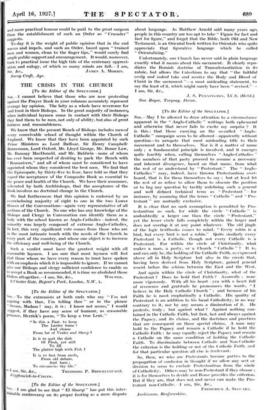[To the Editor of the SPECTATOR.] SIR,—May I be allowed
to draw attention to a circumstance apparent in the " Anglo-Catholic " writings both ephemeral and otherwise that never fails to excite my surprise ? It is this : that those carrying on the so-called " Catholic " campaign seem to be allowed—apparently without question—to arrogate that most misleading title to their movement and to themselves. Nor is it a matter of name only ; a fundamental principle is involved, and it emerges quite forcibly when, calling themselves " Anglo-Catholics " the members of that party proceed to assume a necessary and inherent divergence, based on that name, from what the rest of us understand by " Protestant." The " Anglo- Catholics " may, indeed, have thrown Protestantism over- board, that is for them themselves to say : but at least let the rest of us refuse to allow them to obscure the position or to beg any question by tacitly redefining such a general and well defined technical term as " Protestant "— for instance, by assuming that the terms " Catholic " and " Pro- testant " are mutually exclusive.
It is clear that no such assumption is permitted by Pro- testantism as such, for while the circle " Catholic " is undoubtedly a larger one than the circle "Protestant," yet the lesser circle falls completely within the larger and does not overlap it at any point whatever. The old jingle of the logic textbooks comes to mind, " Every robin is a bird, but every bird is not a robin." Quite similarly every Protestant is a Catholic, though not every Catholic is a Protestant. For within the circle of Christianity, what makes a man, a party, or a Church " Catholic " ? It is, and can only be, the holding of the Catholic Faith, as expressed above all in Holy Scripture but also in the creeds that, having been derived from Holy Scripture, gained general assent before the schism between the East and the West.
And again within the circle of Christianity, what of the Protestant ? Does he hold that Faith ? Assuredly ; none more vigorously. With all his heart—yea with a heart full of reverence and gratitude he pronounces the words, " I believe in the Holy Catholic Church " ; and because of his Faith he is most emphatically a Catholic. His quality of Protestant is an addition to his basal Catholicity, in no way contrary to it, nor by any means a diminution of it. He protests, truly ; but against what ? Against nothing con- tained in the Catholic Faith, but first, last and always against the Papacy, and its claims, and the doctrines and practices that are consequent on those special claims. A man may bold to the Papacy and remain a Catholic if he hold the Catholic Faith : he may equally reject the Papacy and remain a Catholic on the same condition of holding the Catholic Faith. To discriminate between Catholic and Non-Catholic the criterion is the holding or not of the Catholic Faith, and for that particular question all else is irrelevant.
So, then, we who are Protestants become parties to the propagation of confusion in thought if we allow any sect or division to seem to exclude Protestantism from the circle of Catholicity. Others may be non-Protestant if they choose ; it is for themselves to decide and Rome provides the criterion. But if they are, that does not and never can make the Pro- testant non-Catholic.---I am, Sir, &c., Inchinnan, Renfrewshire. FREDERICK A. STEI'ART.


































 Previous page
Previous page